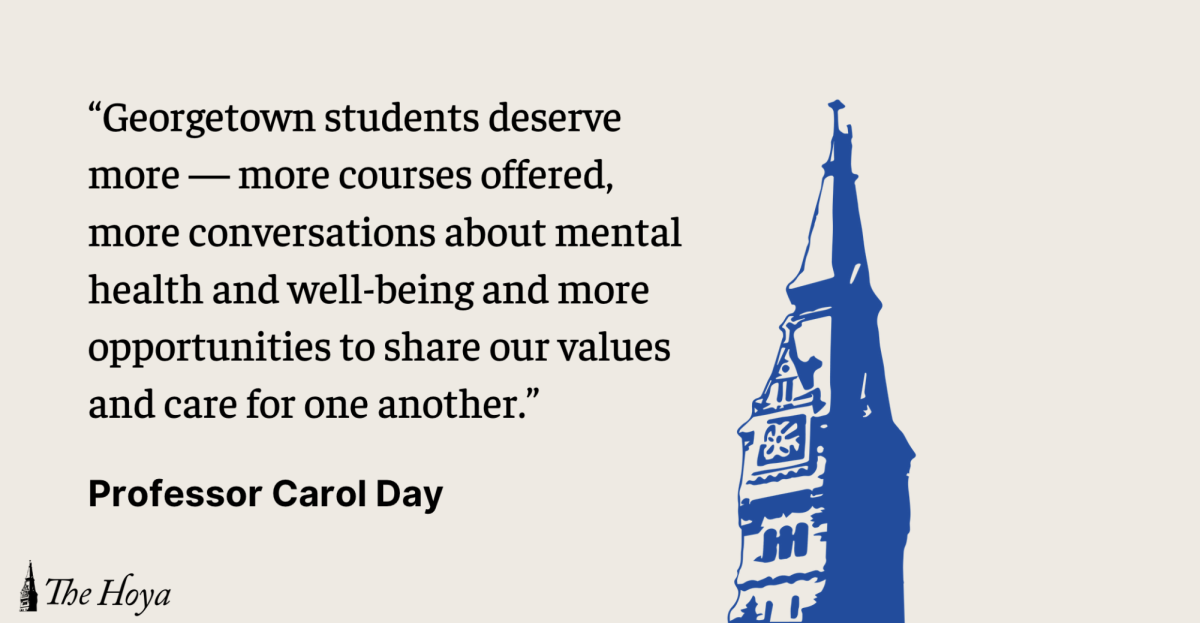
In rapidly changing times, worldwide pandemics, health crises, health and social justice inequities and political upheaval can contribute to feelings of instability for all of us.
College students’ mental health has been a prominent public health concern for decades. According to a large national survey, the Healthy Minds Study, 60% of students met criteria for one mental health problem, 34.6% of students had multiple diagnoses, 38% of students reported symptoms of depression and 34% of students reported symptoms of anxiety.
Students can’t perform well academically when they are stressed; learning about well-being helps students reduce stress and build resilience. Classrooms with a well-being focus become the main environment where students can learn to be healthy. Georgetown University students should recognize the value of well-being courses and practices in their personal lives. Further, they should urge Georgetown to do more to prioritize the development of academic courses, consider implementing a core requirement for well-being courses and consider the adoption of the Okanagan Charter, which calls on universities to make well-being a priority for the entire campus, including faculty, staff and students.
Universities across the country have been offering and expanding resources for mental health both in person and via teletherapy since the COVID-19 pandemic. All students can benefit from learning about ways to incorporate evidence-informed well-being practices into their lives. This education is essential for personal well-being and flourishing, which are basic to human health.
I teach a course that provides an overview of essential topics and opportunities to apply principles of well-being to physical, social and emotional health, even during difficult times.
The course IDST-112 (now UNXD-2112) was designed and developed by Emeritus Teaching Professor Sarah Stiles and me when the university was remote during the pandemic. The course is similar to the three-credit “Flourishing” course that we developed in 2015 under a grant from the American Association of Colleges and Universities (AAC&U) that was focused on developing a well-being initiative for Georgetown. The research project associated with “Flourishing” provides ample evidence of how well-being concepts can be valuable to students, who reported that it changed their understanding of themselves and gave them the opportunity to learn how to implement components of well-being into their lives.
On the national level, many colleges and universities are offering courses on thriving, well-being and flourishing. Leaders among these institutions are universities such as Harvard University, the University of Pennsylvania, Stanford University, the University of Virginia and Yale University. These institutions have a long history of popular courses, research projects and academic departments that are focused on health and well-being. Georgetown can follow their example.
National university-affiliated organizations have also formed coalitions working to expand and enhance initiatives that support campus-wide health and well-being, including the USHPCN, the Wellbeing in Higher Education Network and NIRSA.
Georgetown’s Engelhard Project provides an innovative curriculum infusion approach through partnerships between faculty and campus resource professionals. The project has had 20 years of success offering academic courses that link student health to academic content in courses that are not necessarily primarily focused on health and well-being. It was even featured in Learning Well Magazine. Many other Georgetown courses focus on health and well-being, but we can still do better.
Outside of the curriculum, there are numerous Georgetown student groups that are working to bring mental health and well-being content to peers, like Hoyas Connected and Project Lighthouse. As a Jesuit university, Georgetown has a culture of care and concern for others. Students understand all too well how their peers are struggling to keep up, to do it all, to be the best version of themselves, despite mental health challenges.
Many college students benefit from education about how to bring health and well-being practices into their daily lives. These courses, whether they focus on more commonly understood topics like the importance of sleep or the power of relationships, or lesser-known components of well-being, provide experiential education. They offer valuable experiences and a space to practice, reflect and hone the skill set necessary to face challenges while in college or beyond.
We know that Georgetown students are leaders on campus throughout their time as undergraduates. They will go on to be leaders in their professional lives, in their communities, in their families. They care about each other in ways that will contribute to a longstanding network of alumni, friends and family members. They deserve to have a university education that helps them grapple with the challenges that we all face as humans, as citizens, and to acquire the knowledge and skills to bring well-being education to others.
This seems to be consistent with the mission and traditions of a Georgetown education. Because well-being is consistent with cura personalis, Georgetown is well positioned to be a leader in the field of well-being.
Students are powerful advocates for things they are passionate about. Unless and until well-being courses are expanded and, perhaps required, students should continue to choose Engelhard courses, tell others about valuable courses that helped them understand and embrace well-being for themselves and build their own network of opportunities to deepen their knowledge about what it means to optimize their health and well-being. The addition of the new Healy well-being hub brings a welcome space and focal point for exploring well-being programs, activities and opportunities. Students must be co-creators of what they want this space to be and advocates for the kind of culture they want.
Our Georgetown mission as a Catholic, Jesuit university calls on us to do more, to be more, to be a leader in well-being among institutions of higher education. Georgetown students deserve more — more courses offered, more conversations about mental health and well-being and more opportunities to share our values and care for one another.
Carol R.T. Day is the director of Health Education Services. She is also an adjunct assistant professor of human science for the Georgetown University School of Health.